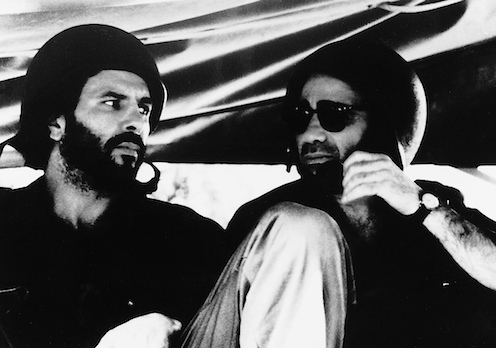Yom Yom (Day After Day)

Full Description
YOM YOM is an existential comedy about a half-Arab, half-Jewish Israeli from Haifa, played by the renowned Israeli actor Moshe Ivgi (CUP FINAL, SFJFF 1992, SHUROO, SFJFF 1991, SH’HUR, 1994). He is Mussa to his Palestinian father, Moshe to his mother and Mosh to his friends, Ivgi’s character is a hypochondriac who fantasizes about his doctor. He is more or less happily married to Didi and he is having an affair with a sexy younger woman, Grisha. He shares all his thoughts and fantasies with his best friend Jules, played by the ruggedly handsome Arab/Jewish actor Juliano Merr. The two share an obsessive fear of death. Unbeknownst to Mosh, they share the beautiful Grisha as well.
Tragicomic episodes in the life of Mosh’s half-Jewish, half-Palestinian family take us through a mirror gallery of daily reality in Haifa. Mosh’s father is an Israeli Arab who must decide whether to sell his family’s ancestral land to a super-modern Israeli mall. This question preoccupies the characters and reveals the complexity of their relationships. At the center of the kaleidoscope is Mosh’s cousin Mimi, a traffic controller who observes parts of the story, transmitted to her office by surveillance cameras positioned all over the city. She is simultaneously a character in the film and its first spectator, evoking the pressure of living in a society so small and tense that it is easy to feel you are constantly being watched.
Filmmaker Bio(s)
For over 20 years, Amos Gitai has brought to the screen images of the Jewish Diaspora and Israeli life alike. Employing both documentary and fictional styles, Gitais uses the camera to reveal history in all its contradictions and ambivalence.
He challenges us, the audience, to scrutinize history anew. Using landscape as a pictorical reference, Gitai traverses time and space to posit not merely a personal experience but a universal one that speaks of migration, struggle and alienation.
In 1973, during the Yom Kippur War, a Red Cross helicopter Gitai was in was shot down by Syrian forces. Following this, Gitai began using his camera as a means of recording and questioning the historical and political events around him. Both his documentaries and his dramatic films present a brutally honest reality, one bejeweled with political conflict, personal plight and a search for meaning. It is a reality that we recognize both as individuals and as members of the larger society.
Amos Gitai was born in Haifa in 1950. Between 1971 and 1975, Amos Gitai studied architecture in the Israel Institute of Technology, and also created his first 8- and 16-mm films. He continued his architecture studies at the University of California in Berkeley where he specialized in the theory of vernacular architecture, and received his Ph.D. in 1986.
In 1977 he began working for Israeli television, where he made several documentaries. After two of his films, Political Myths and House, were censored by the TV authorities, and when Field Diary, shot shortly before and during the Lebanon War, met with much hostility, Gitai moved in 1982, to Paris. From Paris, Gitai continued studying themes of exile, emigration and geography, creating films exceeding the bounds of traditional genre defitions of narrative.
Director(s)
Country(ies)
Language(s)
w/English Subtitle
Release Year
Festival Year(s)
Running Time
109

